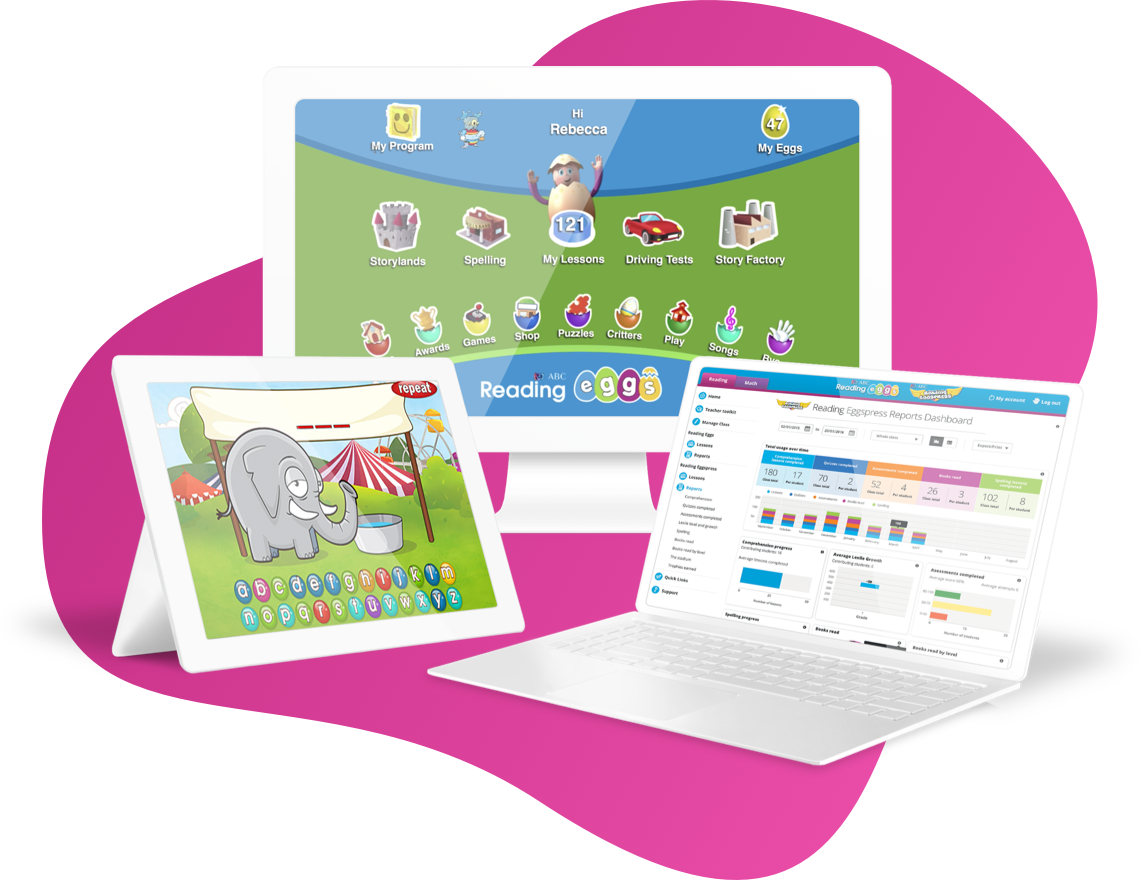
ABC Reading Eggs focuses on the NSW State Curriculum’s ‘Super Six’ comprehension strategies, in a fun and engaging way to help students improve their comprehension skills. The NSW Department of Education and Training highlight that learning comprehension skills takes a student to a new level of active understanding and insight when responding to, interpreting, analysing and evaluating texts. As students develop their comprehension skills, they strive to process texts beyond the written words to gain big picture understanding. ABC Reading Eggs creates a unique learning environment that encourages students to develop their comprehension skills at their own individual level. Students are more engaged in texts, as they are encouraged to choose books based on their own personal preferences and interests. Furthermore, the diagnostic testing and student management tools enable teachers to place each student at different levels based on their individual abilities.
The “Super Six” comprehension strategies
1. Making Connections
Students are encouraged to make personal connections from the text with: something in their own life, another text or something occurring in the world. Students focus on making connections in various activities via the Library and My Lessons. This occurs as students associate what they are reading, understanding and seeing with familiar situations and texts. For example, students predict what the book is about from an image of the front cover, using their skills in making connections. This can be followed up in classroom discussions, by asking students to compare the books they read with other books and real life situations. For example asking children to ‘explain to the class a time when you have experienced a similar feeling to a character in the book you read’. Or ‘Does the front cover remind you of a something you have experienced in your life?’
2. Predicting
Students develop their predicting skills, using information from graphics, text and experiences to anticipate what will be read/ viewed/heard and to actively adjust comprehension while reading/ viewing/listening. In ABC Reading Eggs, prediction plays a significant part in introducing new texts to students, as they use cues from book covers, text and familiar words to make predictions about what the story is about. Students are encouraged to focuses on developing prediction skills throughout My Lessons and the Library, in the book notes and before reading activities. For example in the My Lessons game “Arpiculate” students match each picture to its description. Students reveal sections of the picture tiles until they can predict what the whole picture is about. The faster and more accurately students can answer, the more points they will earn.
3. Questioning
Students learn to pose and answer questions that clarify meaning and promote deeper understanding of the text. Books in the Library and My Lessons have quizzes at the start and/or the end of the book to encourage students to make predictions and draw conclusions from cues and also to test their level of understanding of the texts they read. Students are presented with a range of activities to develop their questioning skills including prediction, word understanding/meaning, dictionary meanings and word studies. For example the “Audience and Purpose” questions in My Lessons help students as they answer questions to clarify the meaning of the text, encouraging students to develop deeper understanding and a big picture view of text they read. The skills students develop online can be further consolidated at home or in the classroom by further questions from parents and teachers during a book reading to continue to support a child’s understanding. Open-ended questions, or questions that connect with a child’s feelings toward the book can provoke further interest and engagement is often a great place to start.
4. Monitoring
Students learn to stop and think about the text and know what to do when the meaning is disrupted. With all Library Books, students are given access to excerpts and can re-read texts at any point during the quiz so that they can be actively ‘monitoring’. This ensures students have understood what they have read and encourages them to apply their knowledge in answering the questions to find deeper meanings.
5. Visualising
Students create mental images from text they read/view/hear. Visualising brings the text to life, engages the imagination and uses all of the senses. The books within ABC Reading Eggs have visual aids along with the text, however the construction of the books use language that assists in developing a students visualising skills as they learn to picture scenarios being presented to them in their heads. Quizzes also promote this recollection of images, where a student must draw on what they have read to answer questions that required visualizing. For example the ‘Picture this Sentence’ quiz in the stadium, students are prompted to select the sentence that links most correctly to the picture displayed.
6. Summarising
Students learn summarising skills as they identify and accumulate the most important ideas and restate them in their own words. This is also focused on in My Lessons and Library quizzes as many of the books have book notes and activities to encourage student understanding to be further drawn out. For example ‘Who, What, Where and When’ and “Main Ideas and Details’ questions in My Lessons and the end quizzes help students to identify and accumulate the most important ideas about the story as they make connections from what they have learnt.
Teacher-directed learning
In addition, teachers have access to an amazing range of resource via their teacher console allowing them to continue to target the “Super Six” Comprehension Strategies in the classroom. We encourage teachers to take a look at both the ‘Targeting Comprehension Interactively’ and the comprehension demo lessons. These resources are available in the ‘teachers resources’ section of the teacher console and are broken up into three versions for lower, middle and upper Primary. Furthermore, these resources can be used on interactive whiteboards or printed for your class.
In conclusion, once a student has read a book and completed the associated tasks in ABC Reading Eggs, they will have developed skills across a number of the ‘Super Six’ Comprehension strategies. This will help students to continue to learn to identify and convey the important ideas, messages and plots of the stories they read based on their individual skills, interests and capabilities.
Need help keep track of student’s progress with comprehension?
We’ve got you covered – Reading Eggs helps you keep track of student’s progress with essential literacy skills, covering:
Need help building student comprehension skills?
Reading Eggs has you covered with:
- Comprehension activities with additional resources
- Lessons, books & activities you can assign to groups, individuals, or the whole class
- Detailed reporting of student usage, participation & progress.












